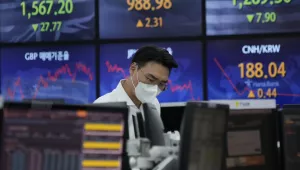Now that Janet Yellen is to be Chair of the US Federal Reserve Board, attention has turned to the candidate to succeed her as Vice Chair. Stanley Fischer would be the perfect choice. He has an ideal combination of all the desirable qualities, unique in the literal sense that nobody else has them. During his academic career, Fischer was one of the most accomplished scholars of monetary economics. Subsequently he served as Chief Economist of the World Bank, number two at the International Monetary Fund, and most recently Governor of the central bank of Israel. He was a star performer in each of these positions. I thought in 2000 he should have been made Managing Director of the IMF.
One has trouble thinking of another economist-at least, since Keynes!-who has done as well as he at combining analytical skill, good policy sense, clear expression, selfless dedication toward making the world a better place, and the ability to get everything done — and with imperturbable good humor as well.
Most relevantly, he has a lot of experience at crisis management, having been on the firing line at the IMF during the currency crises of the 1990s and again having responsibility for the economy of Israel during the Global Financial Crisis of 2008-09. Janet Yellen, who is expected to be anointed imminently as the new Fed Chair, also has an unusually good combination of qualifications in both the academic and policy realms. But she is at her best when she has had a chance to prepare meticulously. She would be usefully complemented by someone who has a lot of experience at dealing with crisis situations where one often does not have time to prepare. Together they constitute a great team.
Fischer’s qualities were glowingly attested to at a conference in honor of his 70th birthday last month, the IMF’s Annual Research Conference, November 7-8, in Washington. Among those doing the attesting were outgoing Fed chairman Ben Bernanke, who in the 1970s was one of Fischer’s many doctoral students when he taught at MIT. (As was I.)
The same conference has been much discussed for another reason: Larry Summers, Paul Krugman, and Fed officials in their presentations to the large gathering each put forward provocative theses concerning the slow pace of economic growth in recent years. These claims will be important to the Fed’s job in 2014 and beyond.
The controversial Summers explanation for slow growth has received perhaps the most attention over the last month. He said that the economic crisis is not over until it is over, which is not yet. He boldly suggested that the reason for sub-par growth over the last ten years is a fundamental structural change, which he identified as secular stagnation: the natural or equilibrium real rate of interest may have fallen below zero permanently, perhaps as low as negative 2 or 3 per cent. Summers offered two possible reasons for the fall in the real interest rate: a saving glut coming from Asia or a long-term IT-induced decline in the relative price of capital goods that has reduced needed investment relative to saving. (Krugman offers two more possible explanations: a decline in the population growth rate and a decline in the productivity growth rate.)
If the Summers claim were right, we would really be in trouble. Central banks already can have difficulty in severe recessions attaining a sufficiently low real financial interest rate — i.e., nominal interest rate adjusted for expected inflation — because the nominal interest rate cannot go below zero. (This problem used to be called a liquidity trap and is now called the “Zero Lower Bound.”) At a minimum, they can’t do it without inflation higher than we would like. In the Summers scenario, the low equilibrium rate would mean chronically low growth. (He did actually say “forever.”)
At the conference, Fischer himself seemed more optimistic that monetary policy can work, even under current conditions. Quantitative easing can push down the long-term interest rate. So can forward guidance. And there are other channels besides the real interest rate, whether short-term or long: the exchange rate, stock market prices, the real estate market, and the credit channel. As Ken Rogoff said on the same panel, “you throw the kitchen sink at it; you do everything that is possible.”
Top Fed staff members are not usually the sort of people who go out on a paradigm-shaking limb in the way that professors are prone to do. But David Wilcox, Director of Research and Statistics, and his Fed co-authors (Dave Reifschneider and William Wascher), did it at the IMF conference. Their thesis was that US output and employment in the last few years has reflected slow supply growth — not because of an exogenous structural change of the Summers sort, but as an endogenous consequence of the financial crisis. The severity and duration of the downturn that began in December 2007 has been steadily eroding the capital stock and the size and skills of the labor force. Business fixed investment has been low. (Firms don’t build new factories, even when the cost of capital is low, if they don’t have the customers to sell to.) Long-term unemployment has been high. (Workers who have been out of a job for a long time have trouble finding someone willing to hire them and may drop out of the labor force altogether.) The result is that productive capacity and the effective labor force have moved onto diminished growth paths. The cumulated supply shortfall - the authors estimate that potential output is by now 7% below the pre-2007 trajectory –may be larger than the current shortfall in output attributable to the ongoing lack of aggregate demand itself.
What are the implications for policy? On the one hand, this unfortunate recent history makes the Fed’s job even harder that it has been, because it further limits the ability to stimulate growth without causing inflation. On the other hand, it makes it all the more important to maintain adequate demand stimulus so long as unemployment is high, because otherwise the negative effects on growth will be long-lasting. The Wilcox paper, even though representing “the views of the authors alone,” thus supports continued monetary ease in 2014.
The Krugman thesis is as surprising as the other two propositions presented at the IMF conference: Concerns about US fiscal deficits and debt are misplaced even in the longer term. Deficit hawks worry that at some point global investors will lose their enthusiasm for holding ever-greater amounts of US debt, resulting in a sharp depreciation of the dollar. Krugman’s controversial claim is that, even if this were to happen, interest rates would not rise and the effect of the depreciation on the US economy via an increase in net exports would be expansionary, not contractionary. No hard landing for the dollar. (The big difference between the US and the situation of emerging markets in the 1990s - where devaluation was contractionary — is that all the US debt is denominated in its own currency.) The policy implication is that there is less reason to worry about the long-term debt problem and more reason to worry that fiscal contraction over the last three years has been depriving the economy of needed demand.
The record of the last few years has indeed been discouraging. Even though prompt action halted the 2008 financial crisis and the initial monetary and fiscal stimulus helped end the recession itself in 2009, the recovery since then has been painfully slow.
The bottom line seems to me that the main problem has been destructive fiscal policy coming out of the Congress: misguided fiscal drag in the short-term in 2010-13; repeated unnecessary disruptive and uncertainty-maximizing political crises in 2011-13 (debt ceiling showdowns, government shutdown, and sequestration); and little progress on the genuine longer-term fiscal problem, which is the 40-year prognosis for US debt (a result of projected growth in entitlement spending). These fiscal failures have together probably subtracted more than a percentage point from US growth in each of the last three years. Especially if Wilcox is right about the supply-side exacerbation of slow demand growth, then fiscal obtuseness can explain what is going on by itself; there is no need for Summers’ deus ex machina.
But there are grounds for optimism in 2014. For the first time in four years, Congressional fiscal policy will probably not have a negative effect on growth. True, it would be better if fiscal policy could actually make a positive contribution. But ending the negative contributions is a political development that deserves more celebration than it has received.
And meanwhile monetary policy will be in good hands, especially if Fischer joins the team.
References
William English, J. David López-Salido and Robert Tetlow ,”The Federal Reserve’s Framework for Monetary Policy-Recent Changes and New Questions,” IMF Annual Research Conference, Washington, DC, Nov. 2013. http://www.imf.org/external/np/res/seminars/2013/arc/pdf/english.pdf
Paul Krugman, “Currency Regimes, Capital Flows, and Crises,” Mundell-Fleming Lecture, IMF Annual Research Conference, Nov. 2013. http://www.imf.org/external/np/res/seminars/2013/arc/pdf/Krugman.pdf
Dave Reifschneider, William Wascher, and David Wilcox, “Aggregate Supply in the United States: Recent Developments and Implications for the Conduct of Monetary Policy” IMF Annual Research Conference, Nov. 2013. http://www.imf.org/external/np/res/seminars/2013/arc/pdf/wilcox.pdf
Larry Summers, “IMF Fourteenth Annual Research Conference in Honor of Stanley Fischer,” transcript,November 8, 2013. http://larrysummers.com/imf-fourteenth-annual-research-conference-in-honor-of-stanley-fischer/
[This is an extended version of a Project Syndicate op-ed. Comments can be posted there.].
Frankel, Jeffrey. “ Stan Fischer, the Fed, and Sub-par US Growth .” December 26, 2013



